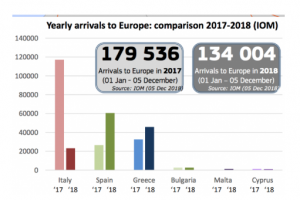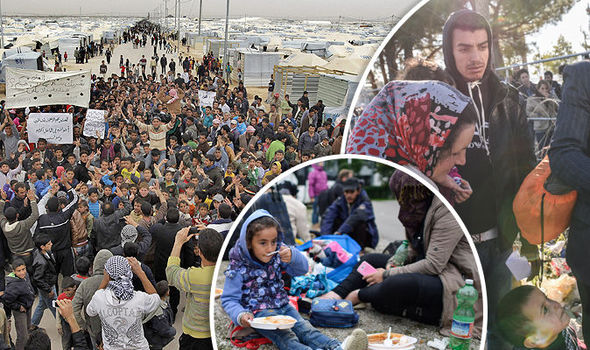This article is written by Anshika Gubrele, second-year BA LLB student of Bharati Vidyapeeth New Law College, Pune. In this article, she discusses the European Refugee Crisis and the constant changes in the position of Germany and France highlighting the approaches used by them to tackle the crisis. A broader picture has been provided about the government perspective on the crisis and the ways it dealt with the refugees. An emphasis has also been laid on finding a compromise on how to deal with refugees at the international level.
Introduction
In 2015, the European Union (EU) was confronted by the biggest flow of refugees since World War II. This event triggered an intense debate at the global level. The world media broadcasted this burning issue. Earlier, the EU was an example of a powerful union. The main point for this political discourse was, in particular, the uneven distribution of the refugees among the Member States (MSs). This disproportionate share of the prices and burdens reopened the discussion on burden sharing measures. Such measures have been considered by scholars and some Member States (MSs) as an effective measure to deal with the refugee crisis.
Who are refugees?
Refugees are the people who forcefully leave their own country in order to escape from persecution, violence and/or war.
What are the European Refugee Crises all about?
During the advent of 2011, the European continent experienced the huge inclusion of drifters in their soil. This is due to the emergence of political instability and the growth of armed rebellions across the Middle East nations. This event earmarked the exploitation of the normal Arab citizen and how the people raised their voice against the ruling system of that country and its revolution became a marking event on the pages of history. This civil war led to problematic situations in the Middle East. This migration in huge diaspora played both positive and negative role for European states.
So far Europe has received millions of applications for asylum-seekers. Civil wars were at its peak, wide-ranging regional instability occurred, an economic and demographic decline of the Arab League and overall internal disturbances in the Middle East alarmed security threat at the global level.
Numerous polls indicated that this huge intrusion of asylum seekers in some states of European soil is compounded by this reason. Refugee migration which is usually a burden in many aspects for the nations is surprisingly tackled by France and Germany in an unexpected manner. Both the country’s long-standing approaches to immigration and refugees show variation, with open arms standing approach by Germany.
Background of the European refugee crisis
Among all the regions of the world, the large number of refugee immigrants are from Syria, Afghanistan and Iraq as these three nations suffered a lot from the increase in the peak of the Civil war, an increase in the number of radicals, caused a major- hit to economic resources, fewer employment opportunities, diminished health-care facilities and so on. Due to such huge diaspora of refugees, there were numerous refugee-immigrants who came and settled in Europe.
To categorically describe the problems of particularly these three countries which led to this large influx of the refugees then, Syria, which was experiencing bloodshed civil war in the country after the failure of the Arab Spring Revolution. If we take a look at the scenario in Afghanistan, the government which was later elected encouraged war against the Taliban which led to political instability and worse economic conditions of the country which also led to fleeing of a huge number of Afghans from their native state and to start hunting for shelter in European countries, most probably in Germany and France.
Besides, Syria, Iraq and Afghanistan there were other under-developed and developing nations from where refugee migration took place such as Eritrea, Pakistan, Nigeria, Somalia and Sudan.
Economic Opportunities and Challenges of the Refugee Crisis
A large number of refugees influx is a general economic concern among the European nations as this additional burden in population will end up creating situations of unemployment and other repercussions that would affect the economies.
The additional burden of the refugee crisis also caused fear to their pre-existing complications in the economy which was quite rational. As the nation was itself in a weak position to fulfil the needs of its own population and further humanitarian heartedness to intake refugees created a wave of panic in the state.
There have been numerous short-term solutions which are proposed in the order of merit, to fund the additional expenses likely to be incurred while dealing with the refugees. For example, there was a suggestion given by the German Finance Minister, Wolfgang Schauble in 2016, that the member nations of EU could surcharge tax on diesel and gasoline so that economic expenses of the refugee situation in EU could be managed. These implementations on tax reforms could contribute towards uplifting the economies by inflation of money supply.
Only after the refugees entered the labour market, the government started receiving fiscal benefits in the long run. The flow of immigrants, most of whom are young, skilled and keen to work in different positions, fuels the economic growth. An important investment is to provide training for the utilisation of that skill by identifying the specific skills, that the labour possesses and then integrating them into the labour market.
Investment in the special public training programs is expected to give positive results when these migrants based on their specialized skills are employed. Hence, to recognize refugees based on their previous qualification and to initiate special training programs according to their qualification, to integrate them in the society is considered as smart work.
To cope up with the short-term and the long-term challenges of the refugee crisis, it is vital to collaborate with the private entities with government and non-governmental organizations. By these measures, the business corporations will receive higher profits which will also lead to business growth.
To accelerate the process of allowing the immigrants to join the labour force, the Federation of German Industries (BDI) in Germany has suggested the changes in the German labour regulations and has focused on the advantages that the business world would enjoy because of the contribution of the refugees. The private and the government sector can work hand-in-hand, as one sector can help in job allocation for refugees while the other sector can manage the flow of asylum seekers.
Refugees Social Integration
To make a society and a community a social family, it is important to integrate refugee-migrants with the native-born individuals of that nation for the cultural mix-up. Moreover, the refugees must not feel isolated and the nation should have a good social image that empowers their diplomatic policy and strengthens their business tie-ups.
Integration of the refugees is a multi-dimensional aspect, referring to the integration of the economic, health, education and social contexts. Generally, there is a lack of understanding of the diversity and the range of experiences which they bring with them.
Professionals from the field of mental health were given the task, and assistance was also offered so that they focus on helping patients to meet their goals, as it is a wider multi-sectoral part of a collaboration with social workers, refugee organizations, housing, and employment agencies.
European Human Rights Law
European Convention on Human Rights provides an outlook for the European Union’s asylum laws. It was drafted while keeping several things in mind such as protection of human rights and providing equal rights to men and women, without any discrimination.
Furthermore, the convention contains 17 articles which grant protection to the individuals regarding the basic rights that a human must be given. Also, the convention plays a significant role in taking care of the violation of an individual’s right by any member state or courts of law.
How can the refugees be given aid and assistance?
Refugees must get all the basic health services that are required including the mental health services. They should be employed in various sectors if they are qualified enough for the work that is to be given. They should also be provided with education and should not be deprived of it. Also, they must be provided with facilities of uniting with their family members and there should be a fast process for it.
Refugees in Europe statistics 2018
The European Commission released the new statistics for the refugees who came to Europe and tried to settle there. The statistics for the year 2018 indicates that there were almost 134,000 refugees entering and migrating to Europe. There is a significant decrease in the number as compared to the previous year i.e. 2017. In the year 2017, there were nearly 180,000 migrants and refugees who came to Europe. According to the statistics, Spain had the highest number of refugees in the year 2018.

Asylum Seekers in Europe
The illegal asylum seekers were sent back to their country of origin as per the rules and policy of the European Government. The government also estimated that thousands of people having no legitimate asylum claim were sent back to their country since then. The objective behind such a policy was to cut down the number of illegal migrants.
How India can help the Europeans?
Herbert Krauss, Ministry of Foreign Affairs, Austria, Head of the Department for the Common Foreign and Security Policy (EU) said that India is also an experienced country as there are many refugees of Bangladesh residing in the country. It knows very well how to deal with such migrants in order to avoid a crisis. Thus, Europe can take lessons from India to tackle the crisis and deal with migrants.
Labour Mobility Partnership Agreement
India is in discussion with Europe regarding the LMPA that is the Labour Mobility Partnership Agreement focussing on the need for legal channels for the system of migration. The agreement is mainly to enhance the migrating conditions of the refugees.
Conclusion
The article observed the background of the European refugee crisis and threw light on the economic challenges and opportunities faced by the European Union. The European Union states could have made it difficult for refugees to enter the EU by closing their borders but they did not do so as this might demoralize them. But at the same point, this is not a favourable option as this might increase the entry of illegal migrants. Thus, there is a need for a suitable platform for the refugees that could regulate them in a better way, provide them with opportunities and make the best out of them in a systematic and well-planned manner. This will result in making the refugees productive instead of being a burden on the country.
References
- Alonso, S., and S.C.D. Fonseca. “Immigration, Left and Right” Party Politics 18.no.6, (May 17, 2011): 865-84.
- Berber, Nicole, Marcel Lewandowsky, and Jasmin Siri. “The AfD and Its Sympathisers: Finally a Right-Wing Populist Movement in Germany?” German Politics 24, no.2 (Jan.2015):154-78
- Budge, Ian and Denis Farlie. “ Party competition: Selective Emphasis or Direct Confrontation? An Alternative View with Data,” in Hans Daalder and Peter Mair, Western European Pary Systems, London: Sage, 1983.
- Bostwick, W. “Development of Asylum Policy in Germany.” Journal of Refugee Studies 13, no.1(2000): 43-60
- Burgess, Greg. Refugee in the Land of Liberty: France and Its Refugees, from the revolution to the End of Asylum, 1787-1939. Basingstoke: Palgrave Macmillan,2008.
- Goldhammer, Arthur. “ Explaining the Rise of the Front national, Political Rhetoric or Cultural Insecurity ?” French Politics. Culture and Society 33, no.22 (Summer 2015):145-147.
- Cooper, Harry. “European Fear Refugees Threaten Jobs, Increase Terrorism: Poll. “ The Politico. July 12, 2016.
- Chang-Muy, F., & Congress, E. ( Eds.) (2015). Social work with immigrants and Refugees, Second Edition: Legal Issues, Clinical Skills, and Advocacy ( 2nd Ed). Springer, New York, NY.
- Heerena, M. Wittmann, L., Ehlertc, U., 3, Schnydera, U., Maierd, T, Mullera, J.(2014). Psychopathology and resident status – comparing asylum seekers, refugees, illegal immigrants, labour Miele grants, and residents. Comprehensive Psychiatry, 55, 818-825.
 Serato DJ Crack 2025Serato DJ PRO Crack
Serato DJ Crack 2025Serato DJ PRO Crack










 Allow notifications
Allow notifications


